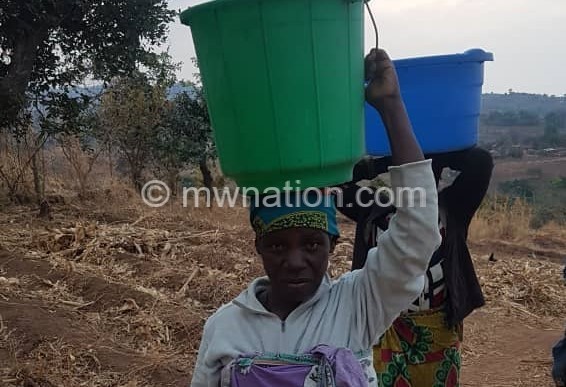Mzandu Health Centre suffers water crisis
At the crack of dawn, pregnant women at Mzandu Health Centre in Ntchisi grab pails to go and draw water from a borehole, not just for their use, but for the labour ward, too.
Every morning, the women are expected to fill up a plastic drum located in the labour ward, for decontamination or sterilisation of equipment as well as sluicing after delivery.

Mzandu Health Centre, located 26 kilometres from Ntchisi District Hospital, has taps—it was meant to have running water, but the water pump is damaged.
The water system was installed in 2012 and only worked for a short while. There has been no running water at the health centre for three years.
The borehole is shared by the community, including health workers that surround the health centre.
“In dry months, there is a fight for water here because the community members feel the health centre should have its own water source. Traditional leaders have intervened several times,” chairperson of the women shelter Grace Malolo said.
She said giving birth is a messy affair and having no running water removes the dignity of a woman who would want to have a bath and clean up immediately after delivering.
With a population of 19 300, Mzandu Health Centre registers about 50 deliveries a month.
Women from AHL Group visited the health centre Friday night as part of the Sleepover Challenge to raise funds for Ntchisi District Hospital and its satellite facilities.
The Sleepover Challenge is a fundraising initiative of Mother’s Fun Run involving prominent women in society to raise awareness about the challenges women face at public health institutions such as Mzandu Health Centre.
When the AHL Group women visited the health centre, there were 16 expectant mothers at the waiting shelter.
ATC general manager Madalitso Jelenje led a group comprising legal services manager Tadala Chinkwezule, adminstration manager Tiya Salimu and finance manager Drine Kulugomba to the sleepover challenge, to understand the difficult situation under which women bring life into the world at the facility.
An otherwise good infrastructure, with five staff houses has not been spared challenges emanating from lack of resources.
The district registers about 15 neonatal deaths a month—babies dying before they reach two weeks old.
According to Ntchisi District safe motherhood coordinator Masuzgo Ngwira, most health centres do not have resuscitation areas for babies who require it.
Nurse/midwife technician Mwenyeheri tells a story of how the health centre resuscitates babies:
“Within a minute of the baby being delivered, but has not cried out, we quickly gather three pieces of zitenje and place them on this bench and wrap the baby in it. It is risky and has not always been successful.”
For the AHL Group leader of delegation, the sleepover challenge was an eye-opening experience.
“The water problem is a big challenge that requires immediate attention. A health centre where mothers are giving birth requires good sanitation and infection prevention measures. That needs water,” she said.
She added that as a tobacco selling company, women of Ntchisi were an important stakeholder.
“We feel their problems are also our problems and we will give the health centre assistance. We will continue to help them where there is such an opportunity,” she said.
Apart from the sleepover challenge, AHL Group has donated 20 mattresses for hospital beds and assorted items to the women, all valued at K500 000.
The AHL Group women who took part in the sleepover challenge are also fundraising individually, and proceeds will be donated to the NPL Mother’s Fun Run initiative.
This year’s Mother’s Fun Run is slated for October 8.





